Fushoushan Farm (福壽山農場) in Greater Taichung is one of a number of farming areas originally established to provide occupation for demobilized soldiers following the establishment of the Chinese Nationalist Party (KMT) government in Taiwan in the 1950s. Although development as a tourism destination nominally began in 1993, it has been slow, and the area is much less widely known than Cingjing Farm (清境農場) and Wuling Farm (武陵農場), originally established with a similar remit and which have developed into hugely popular destinations for people looking for a summer getaway.
Fushoushan Farm is actively trying to catch up, but has remained much more of an agricultural community. It spreads over 800 hectares ranging in altitude from 2,100m to 2,614m above sea level, and is famous for the quality of its peaches, plums, pears and apples, as well as the sweetness of its cabbages. It was first established by 100 sturdy veterans who the Veterans Affairs Commission (行政院國軍退除役官兵輔導委員會) sent out in 1957 to develop high-mountain agricultural sites. They were given three days’ victuals and sent off into the wilds, and according to a much told story, only discovered this well-watered site just before their supplies ran out.
Until recently, the farm only offered relatively primitive accommodation, but is currently making up for this deficiency with the construction of elegant rooms that feature stunning views and hardwood furnishings.
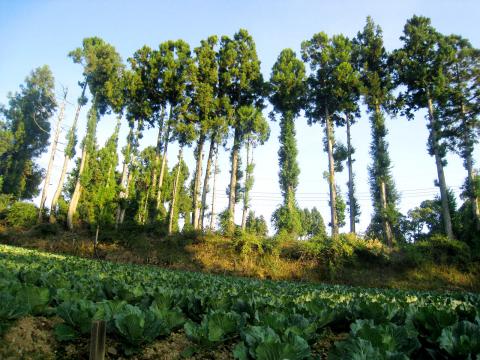
Photo: Ian Bartholomew, Taipei Times
The central buildings of Fushoushan Farm did not promise anything particularly idyllic, looking like a cross between a motel and an agricultural institute. After a strenuous five-hour drive from Taipei, it was distinctly underwhelming. Still, the sweltering summer heat of Taipei and the Lanyang Plain (蘭陽平原) had been left behind as though in another world, and the cool, clean breeze was much welcome.
The farm offers a variety of accommodations that cover a huge range of styles: renovated villas originally servicing visiting officials that have secluded access and gardens (around NT$6,000 a night for two); two-story villas featuring hardwood floors, contemporary furnishings and carefully designed views (around NT$5,000 a night for two); old shipping containers with a roof attached that will house eight people for NT$1,500 per room; and pre-built tent accommodation that sleeps six for NT$1,200 a night. Visitors include everyone from couples out for a romantic getaway to groups of students getting in touch with nature.
I had opted for accommodation in a three-bed wooden hut (NT$2,156 a night) located in the camping area near the scenic Heaven Lake (天池), about a 15-minute drive from the main building. The huts were a step up from the shipping containers, with their own toilet and bath, but are otherwise rather basic. The camping ground is near the top of the farm area, and provides some spectacular views of the night sky and good access to a number of walking trails.
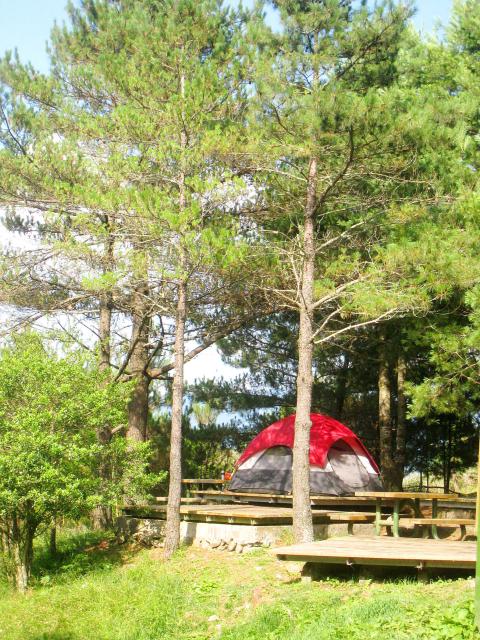
Photo: Ian Bartholomew, Taipei Times
My room was simple though surprisingly comfortable, and came with a TV and an efficient if rather cramped fiberglass bathroom unit. The presence of stray dogs, though remarkably healthy and friendly for the most part, might prove annoying to some. A central building with vending machines and offices is being constructed to provide better management of the camping area.
Fushoushan caters primarily to those looking for a relatively relaxed experience of nature rather than hardcore campers or trekkers. Nevertheless, the Forest Bath Trail (森林浴步道), which is just over 7km long, offers something of a challenge. (Take care: This trail can be slippery, and rising afternoon mists can make it dangerous.) Most other trails are intended for leisurely strolling and viewing the scenery. The mountains are remarkably beautiful, and the sunsets are famous for their magnificent chromatic effects.
Food is an important part of the Fushoushan experience, with many people visiting specifically to purchase freshly picked seasonable fruit. Fushoushan is now approaching the end of its peach season, and next month, a new wave of visitors is expected for the early sweet apples (蜜蘋果) that the farm is particularly renowned for.
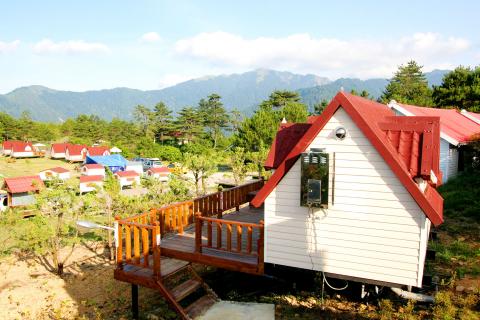
Photo: Ian Bartholomew, Taipei Times
According to one member of staff at the Fushoushan produce outlet, nothing beats the experience of eating fruit prior to the inevitable battering it gets in the shipment process down the mountain. Peaches regularly sell out each day. Rumors that peaches sold by independent vendors and roadside stalls in popular tourism destinations such as Lalashan (拉拉山) were in fact imported from the US have made some visitors wary. Fushoushan Farm, which is still under the management of the Veterans Affairs Commission, provides a fixed price and a guarantee of quality.
While many of those camping out brought their own meals, there is a restaurant providing reasonably priced meals that attempt to showcase local produce. The food is generally quite good, but it is not very imaginative; the menu heavily favors larger parties and the selection of smaller dishes suitable for two is limited. Unfortunately, the village of Lishan (梨山), about a 15-minute drive away, does not seem to offer any outstanding dining options either.
Fushoushan Farm still has many limitations as a tourism destination, and clearly its title of “Taiwan’s little Switzerland” (台灣小瑞士) applies only to the mountain views. But these and the sense of being high up in the mountains in relative comfort are sufficient to make the journey worthwhile.
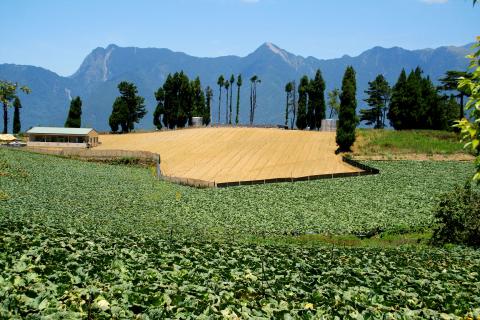
Photo: Ian Bartholomew, Taipei Times
It is worth mentioning that Fushoushan Farm also has special discounts for long stays, starting at NT$6,000 for a week, per person, to NT$18,000 for a month, per person, including three meals a day. There can be no more exhilarating (or indeed cheaper way) of beating the summer heat.
If you go
Fushoushan Farm is located at 29 Fushou Rd, Lishan Borough, Heping Dist, Greater Taichung (台中市和平區梨山里福壽路29號). The visitor center can be contacted at (04) 2598-9202, or call the toll-free service number 0800-073-999. Detailed information about the farm, including room rate schedules and directions, in Chinese, English and Japanese, are available at www.fushoushan.com.tw
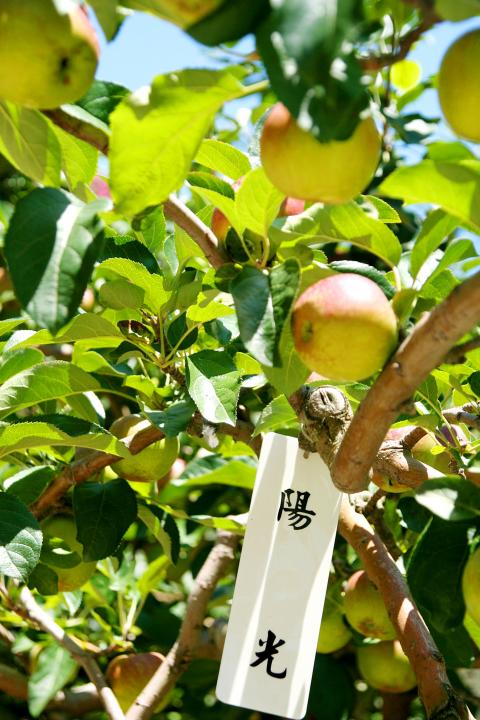
Photo: Ian Bartholomew, Taipei Times

Dissident artist Ai Weiwei’s (艾未未) famous return to the People’s Republic of China (PRC) has been overshadowed by the astonishing news of the latest arrests of senior military figures for “corruption,” but it is an interesting piece of news in its own right, though more for what Ai does not understand than for what he does. Ai simply lacks the reflective understanding that the loneliness and isolation he imagines are “European” are simply the joys of life as an expat. That goes both ways: “I love Taiwan!” say many still wet-behind-the-ears expats here, not realizing what they love is being an

William Liu (劉家君) moved to Kaohsiung from Nantou to live with his boyfriend Reg Hong (洪嘉佑). “In Nantou, people do not support gay rights at all and never even talk about it. Living here made me optimistic and made me realize how much I can express myself,” Liu tells the Taipei Times. Hong and his friend Cony Hsieh (謝昀希) are both active in several LGBT groups and organizations in Kaohsiung. They were among the people behind the city’s 16th Pride event in November last year, which gathered over 35,000 people. Along with others, they clearly see Kaohsiung as the nexus of LGBT rights.

In the American west, “it is said, water flows upwards towards money,” wrote Marc Reisner in one of the most compelling books on public policy ever written, Cadillac Desert. As Americans failed to overcome the West’s water scarcity with hard work and private capital, the Federal government came to the rescue. As Reisner describes: “the American West quietly became the first and most durable example of the modern welfare state.” In Taiwan, the money toward which water flows upwards is the high tech industry, particularly the chip powerhouse Taiwan Semiconductor Manufacturing Co (TSMC, 台積電). Typically articles on TSMC’s water demand

Every now and then, even hardcore hikers like to sleep in, leave the heavy gear at home and just enjoy a relaxed half-day stroll in the mountains: no cold, no steep uphills, no pressure to walk a certain distance in a day. In the winter, the mild climate and lower elevations of the forests in Taiwan’s far south offer a number of easy escapes like this. A prime example is the river above Mudan Reservoir (牡丹水庫): with shallow water, gentle current, abundant wildlife and a complete lack of tourists, this walk is accessible to nearly everyone but still feels quite remote.